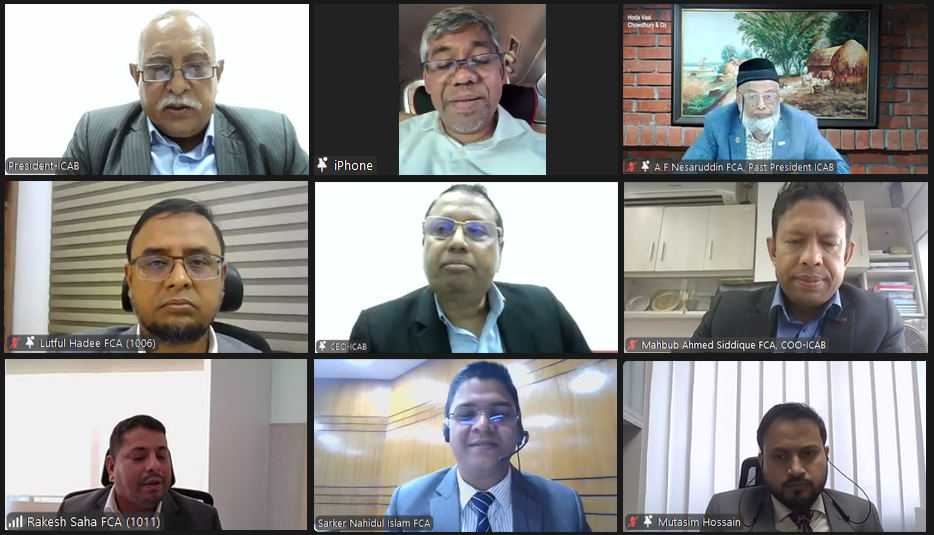News Flash

DHAKA, Sept 3, 2025 (BSS) - The Institute of Chartered Accountants of Bangladesh (ICAB) hosted a seminar on "Changes in the Income Tax, VAT and Custom Laws through Finance Ordinance 2025" today through zoom platform.
National Board of Revenue (NBR) chairman Md. Abdur Rahman Khan attended the seminar as the chief guest while NBR members AKM Badiul Alam (tax policy) and Mohammad Mobinul Kabir (custom policy & ICT) addressed the event as special guests.
In his welcome address, ICAB president NKA Mobin said the Finance Ordinance underscores a strategic push to raise the tax-to-GDP ratio through automation and infrastructure expansion.
This is essential for creating the fiscal space required to fund Bangladesh's ambitious development goals in renewable energy, agriculture, and critical infrastructure, he added.
By prioritizing science-based learning, digital skills, and entrepreneurship, the government aims to build a future-ready workforce to harness the Fourth Industrial Revolution, said ICAB president adding, climate resilience is a critical pillar, integrated into energy security through a balanced approach to renewable development and oil and gas exploration.
For accounting and finance professionals, Mobin said there is an opportunity to play a pivotal role in the automation of tax administration, streamlining trade processes, providing astute advisory services and ensuring compliances.
"CAs role is vital in guiding businesses through reforms, helping them not only adhere to new regulations but also capitalize on a modernized fiscal landscape," he added.
Former ICAB president AF Nesaruddin moderated the session.
Rakesh Saha, Partner, Tax & Regulatory Services, Ernst & Young Advisory Services Bangladesh Limited, Sarker Nahidul Islam, Director, Tax and Advisory Services, Rahman Rahman Huq, Chartered Accountants; and Mohammad Mutasim Hossain, Director, Taxation & Corporate Affairs, ACNABIN, Chartered Accountants presented their respective keynote papers, said a press release.
According to the keynote papers, the VAT deduction and collection at source guidelines, 2025 has been introduced by replacing the previous VAT deduction and collection at source Guidelines, 2021 under which a VAT registered recipient of supply is required to make increasing adjustment in his or her VAT return for VAT deducted or collected at source from suppliers and deposit the same as a part of the net VAT liability before submission of VAT return.
Previously, VDS was required to be separately deposited in government exchequer within 7 days of expiry of the tax period concerned. Hence, the new mechanism will significantly reduce the time and efforts required to be spent for depositing VDS.
Certificate of VAT deducted or collected at source i.e. form Mushak-6.6 is required to be issued within 3 working days of filing VAT return which was previously required to be issued within 3 working days of depositing the VDS.
However, the form of certificate of VDS (Mushak 6.6) needs to be updated mentioning increasing adjustment with other methods of depositing VDS.
A VAT un-registered entity is required to deposit the VAT deducted at source into the government exchequer by A-challan or E-payment systems within 15 days of payment to suppliers and issue a certificate (i.e. form Mushak 6.6) to the supplier within 3 working days of depositing the VAT deducted at source.
Highlighting the important changes in VAT & SD Act and Customs Act through the Finance Ordinance, 2025, keynote presenter Rakesh Saha, Partner-Tax, EY Bangladesh said, previously it has been mentioned in the general order that the benefit allowed to the commercial importers will not be applicable if the supply comes under the purview of "Procurement Provider" under Service Code S037.
"Now transport contractor is exempted from import of input of manufacturing exportable goods and export of goods," he added.
VAT exempted goods are vegetable materials of a kind used primarily for plaiting (for example, bamboos, rattans, reeds, rushes, osier, raffia, cleaned, bleached or dyed cereal straw, and lime bark) including shallot leaves, betel leaves, banyan leaves, jackfruit leaves, shishal leaves, sabai grass while VAT exempted service are day labor (except human resource supply and management organization), services rendered by the employee to employer, sale or transfer of land and buildings (earlier 'land' only) and their registration (except land development organization and building construction organization).
The supply of a service shall be zero-rated, if the recipient of such a supply are a non-resident who stays outside Bangladesh at the time of the supply of service; or a resident and receives such services, in effect, staying outside Bangladesh at the time of the supply of service.
However, such service is not applicable for directly related to any land situated in Bangladesh, physically given on any goods situated in Bangladesh at the time of the supply, and provided by global roaming services, to a person temporarily outside Bangladesh.